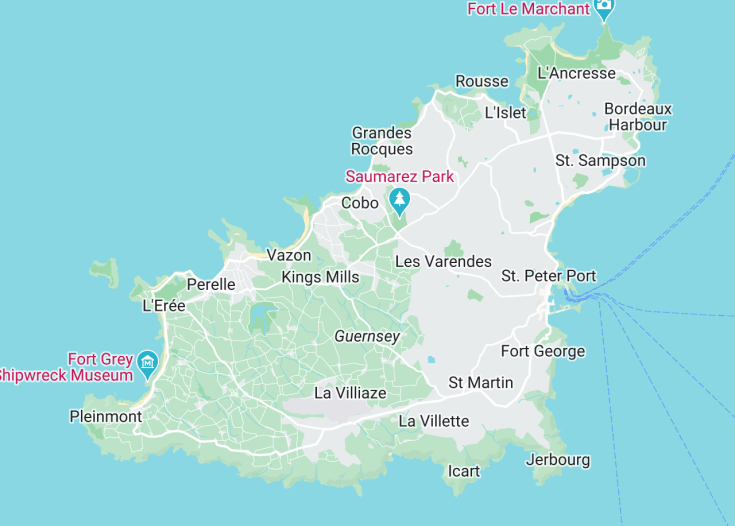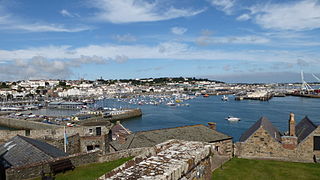Situated in the English Channel, Guernsey offers a delightful mix of British charm and French flair. This Channel Island enchants with its rugged coastal cliffs, verdant pastures, and rich maritime history. Beyond its scenic beaches and harbors, Guernsey’s cobbled streets reveal tales of ancient forts and wartime adventures. Yet, the island’s real essence can be found in its warm, hospitable locals, traditional festivals, and a cuisine that blends the best of the land and sea. Truly, Guernsey is a serene retreat steeped in captivating stories.
Guernsey’s weather can be unpredictable; always pack layers and a light waterproof jacket.
Consider renting a bicycle to explore the island’s scenic countryside and historical sites.
Top destinations in Guernsey (United Kingdom)
Guernsey: a charming island getaway
| Capital | Saint Peter Port |
| Time in Guernsey | GMT |
| Language spoken | English |
| Population | 62,792 (Source: World Bank, 2021) |
| Religion | Christianity (90%) Other religions (5%) Non-religious (5%) |
| Currency | Pound Sterling (£, GBP) |
| Airports | Guernsey Airport |
Guernsey, an island steeped in mystique and history, is one of the Channel Islands in the English Channel. It sits elegantly off the coast of Normandy, France, and offers a captivating tapestry of natural beauty and cultural depth. Though its footprint is small, Guernsey’s significance is immense. The island has witnessed Viking invasions, Roman visits, and German occupation during World War II. It wears its past proudly, with ancient castles and war forts dotting its landscape. Moreover, its unique status as a British Crown Dependency allows it to self-govern, an embodiment of its enduring spirit. But it’s not just the storied history that enchants visitors. Guernsey’s rugged cliffs, serene beaches, and quaint townscapes paint a picture that has inspired artists and writers alike, including the famed Victor Hugo, who sought refuge here. The island’s blend of French and British influences has also shaped its distinctive cultural and culinary landscape.
Where is Guernsey located?
Guernsey, a stunning island in the English Channel, is part of the Bailiwick of Guernsey, a British Crown dependency. It is situated off the coast of Normandy, France, and is known for its picturesque landscapes and beautiful beaches.
What is Guernsey famous for?
Guernsey is famous for its rich history and unique cultural blend of British and French influences. The island is renowned for its charming capital, {destination_capital}, with its cobblestone streets and historic buildings. Guernsey is also known for its stunning coastal cliffs, vibrant festivals, and delicious seafood cuisine.
History
Prehistoric Era: Up to 1st Century AD
The earliest signs of human activity in Guernsey trace back to the Mesolithic period when hunters and gatherers arrived on the island. By the Neolithic period, these early settlers began to establish more permanent communities, as evidenced by the megalithic monuments like dolmens and menhirs that still dot the island’s landscape. The influence of Celtic tribes can be discerned from artifacts and burial sites from the Iron Age.
Roman Rule: 1st Century AD – 5th Century AD
With the expansion of the Roman Empire into the region, Guernsey became a part of the Roman world. The island, while not heavily Romanized, saw the establishment of trade routes and the influx of Roman goods. Some traces of Roman-era settlements and shipwrecks provide evidence of their presence on the island.
Medieval Period: 5th Century AD – 15th Century AD
Following the fall of the Western Roman Empire, Guernsey faced Viking invasions during the early medieval period. By the 10th century, the island, along with the other Channel Islands, became part of the Duchy of Normandy. When William, Duke of Normandy, became William the Conqueror of England in 1066, Guernsey’s history became closely intertwined with that of England. The island’s strategic location meant it often faced threats from France, and fortifications began to rise as a means of defense.
Early Modern Period: 15th Century AD – 18th Century AD
In 1204, King John lost mainland Normandy to France, but Guernsey and the other Channel Islands remained loyal to the English crown. During the English Civil War in the 17th century, the island was split in its loyalties, leading to internal strife. Guernsey’s importance as a naval base grew, and by the 18th century, privateering became a significant aspect of its economy.
19th Century to World War I
Throughout the 19th century, Guernsey witnessed economic expansion, particularly in its stone quarrying, greenhouse flower and tomato growing industries. The island also became a popular destination for Victorians seeking a holiday. The early 20th century was relatively peaceful for Guernsey, but its strategic location meant that it was never far from the undercurrents of wider European tensions.
World War II: 1939 AD – 1945 AD
One of the darkest periods in Guernsey’s history was its occupation by German forces during World War II. In 1940, the island was demilitarized and subsequently occupied. The islanders faced restrictions, deportations, and fortification of the island as part of Hitler’s Atlantic Wall. The island was liberated by British forces on May 9, 1945, a day now celebrated as Liberation Day on Guernsey.
Post-War Era to Present
After the war, Guernsey underwent a period of reconstruction and rejuvenation. The island developed its finance sector, which became a cornerstone of its economy. With the establishment of the Guernsey Financial Services Commission in 1987, the island positioned itself as a leading international finance center. Today, Guernsey, with its blend of rich history and modern sophistication, stands as a unique and vibrant crown dependency, known for its finance services, tourism, and dairy products.
Visit Guernsey
What to see and do in Guernsey
Guernsey offers a variety of attractions and activities that cater to different interests. Here are some recommendations:
- Visit Castle Cornet: This historic castle is located on a small island and offers stunning views of St. Peter Port.
- Explore the German Occupation Museum: Learn about Guernsey’s experience during World War II through a collection of artifacts and interactive exhibits.
- Stroll through the Guernsey Museum and Art Gallery: Discover the island’s rich history and vibrant art scene through its diverse collections.
- Relax on the beaches: Guernsey boasts beautiful sandy beaches that are perfect for sunbathing, swimming, and water sports.
- Explore the nature reserves: Guernsey is home to several nature reserves and coastal walks, offering opportunities for hiking and birdwatching.
- Visit the Little Chapel: Marvel at the intricate mosaics and stained glass artwork in this miniature, intricately designed chapel.
Events in Guernsey
Throughout the year, Guernsey hosts a variety of events and festivals that showcase the island’s culture, history, and natural beauty. Some of the notable events include:
- Guernsey International Food Festival (June): A celebration of local and international cuisine, featuring culinary demonstrations, food stalls, and live entertainment.
- Guernsey Heritage Festival (April-May): A series of events and activities that highlight Guernsey’s rich history and heritage, including guided tours, reenactments, and exhibitions.
- Guernsey Literary Festival (October): A gathering of writers, poets, and literary enthusiasts from around the world, with author talks, workshops, and book signings.
- Floral Guernsey Festival (July): A display of vibrant floral arrangements, garden tours, and horticultural competitions.
- Guernsey Arts Commission Arts Sunday (June): A showcase of local art, music, and performances, held in St. Peter Port.
Best time to visit Guernsey
The best time to visit Guernsey is during the spring and summer months, from May to September. The weather is usually mild and sunny, allowing visitors to enjoy the island’s outdoor attractions and beaches. Additionally, many of the island’s festivals and events take place during this time, providing a vibrant atmosphere and cultural experiences.
Is Guernsey worth visiting?
Guernsey is definitely worth a visit for those seeking a unique blend of history, natural beauty, and island culture. The island offers stunning coastal landscapes, picturesque beaches, and a wealth of historical sites. Visitors can explore ancient castles, delve into the island’s World War II history, and immerse themselves in the vibrant local arts scene.
The island’s peaceful and friendly atmosphere, along with its charming capital of St. Peter Port, make it an ideal destination for a relaxing getaway. Whether you’re a history buff, nature lover, or simply looking for a tranquil escape, Guernsey has something to offer.











